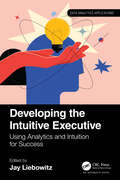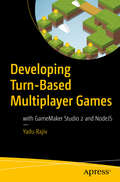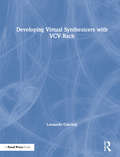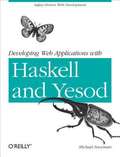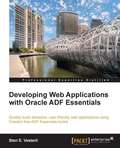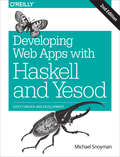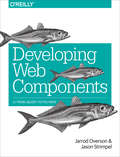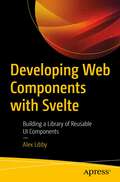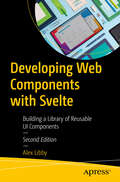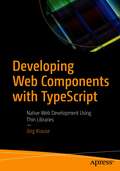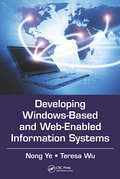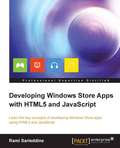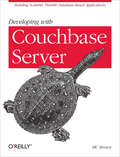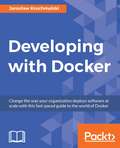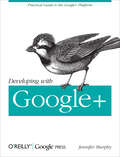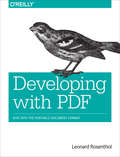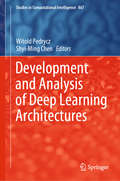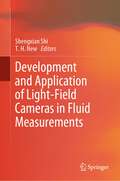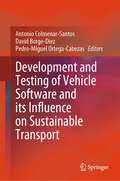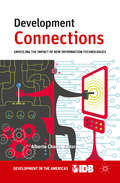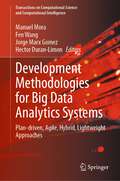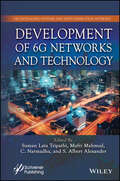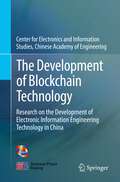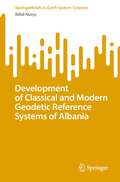- Table View
- List View
Developing the Intuitive Executive: Using Analytics and Intuition for Success (Data Analytics Applications)
by Jay LiebowitzThe leading traits of executives often include creativity and innovation. Research shows that intuition can significantly enhance to these traits. Developing intuitive executives and honing intuition, coupled with the ability to apply data and evidence to inform decision making, is the focus of Developing the Intuitive Executive: Using Analytics and Intuition for Success. Some researchers call the complement of applying data analytics to intuition as quantitative intuition, rational intuition, or informed intuition. Certainly, in today's data-driven environment, analytics plays a key role in executive decision-making. However, an executive’s many years of experiential learning are not formally considered as part of the decision-making process. Learning from both failures and successes can help fine-tune intuitive awareness—what this book calls intuition-based decision-making. Research also shows that many executives do not trust the internal data quality in their organizations, and so they rely on their intuition rather than strictly on data. This book presents the work of leading researchers worldwide on intuition in the management and executive domain. Their chapters cover key issues, trends, concepts, techniques, and opportunities for applying intuition as part of the executive decision-making process. Highlights include: Using intuition to manage new opportunities Intuition in medicine Rules based on intuition Balancing logic and intuition in decision-making Smart heuristics to manage complexity Intuition and competitiveness Intuitive investment decision-making across cultures Showing how intuition in executive decision making should play an important role, this book enables managers to complement their knowledge gained from experience with analytics to improve decision-making and business success.
Developing Turn-Based Multiplayer Games: with GameMaker Studio 2 and NodeJS
by Yadu RajivCreate your first turn-based multiplayer game using GameMaker Studio 2’s built-in networking functions as well as using a simple NodeJS server. This book introduces you to the complexities of network programming and communication, where the focus will be on building the game from the ground up. You will start with a brief introduction to GameMaker Studio 2 and GML coding before diving into the essential principles of game design. Following this, you will go through an introductory section on NodeJS where you will learn how to create a server and send and receive data from it as well as integrating it with GameMaker Studio. You will then apply multiplayer gaming logic to your server and unlock multiplayer game features such as locating a player, syncing their data, and recording their session. What You Will LearnDiscover the architecture of GameMaker Studio 2 Add new features to your game with NodeJS modulesIntegrate GameMaker Studio 2 with NodeJS Master GameMaker Studio 2's built-in networking functionsWho This Book Is ForGameMaker Studio users who want to understand how the networking components of GMS 2 work. Basic JavaScript knowledge is required.
Developing Virtual Synthesizers with VCV Rack
by Leonardo GabrielliDeveloping Virtual Synthesizers with VCV Rack takes the reader step by step through the process of developing synthesizer modules, beginning with the elementary and leading up to more engaging examples. Using the intuitive VCV Rack and its open-source C++ API, this book will guide even the most inexperienced reader to master efficient DSP coding to create oscillators, filters, and complex modules.Examining practical topics related to releasing plugins and managing complex graphical user interaction, with an intuitive study of signal processing theory specifically tailored for sound synthesis and virtual analog, this book covers everything from theory to practice. With exercises and example patches in each chapter, the reader will build a library of synthesizer modules that they can modify and expand.Supplemented by a companion website, this book is recommended reading for undergraduate and postgraduate students of audio engineering, music technology, computer science, electronics, and related courses; audio coding and do-it-yourself enthusiasts; and professionals looking for a quick guide to VCV Rack. VCV Rack is a free and open-source software available online.
Developing Web Applications with Haskell and Yesod
by Michael SnoymanThis fast-moving guide introduces web application development with Haskell and Yesod, a potent language/framework combination that supports high-performing applications that are modular, type-safe, and concise. You'll work with several samples to explore the way Yesod handles widgets, forms, persistence, and RESTful content. You also get an introduction to various Haskell tools to supplement your basic knowledge of the language. By the time you finish this book, you'll create a production-quality web application with Yesod's ready-to-use scaffolding. You'll also examine several real-world examples, including a blog, a wiki, a JSON web service, and a Sphinx search server. Build a simple application to learn Yesod's foundation datatype and Web Application Interface (WAI) Use Shakespearean template languages for HTML, CSS, and Javascript output Produce cleaner, more modular code by learning how Yesod monads interact Implement the yesod-form declarative API to build forms on top of widgets Learn how Yesod and Haskell store session data and handle persistence Use techniques to serve an HTML page and a machine-friendly JSON page from the same URL Create reusable components for several applications with Yesod subsites
Developing Web Applications with Oracle ADF Essentials
by Sten E. VesterliDeveloping Web Applications with Oracle ADF Essentials covers the basics of Oracle ADF and then works through more complex topics such as debugging and logging features and JAAS Security in JDeveloper as the reader gains more skills. This book will follow a tutorial approach, using a practical example, with the content and tasks getting harder throughout."Developing Web Applications with Oracle ADF Essentials" is for you if you want to build modern, user-friendly web applications for all kinds of data gathering, analysis, and presentations. You do not need to know any advanced HTML or JavaScript programming. Business logic can be implemented by adding Java code at well-defined hook points, so you do not need do know advanced object-oriented programming--regular Java programming skills are enough.
Developing Web Apps with Haskell and Yesod: Safety-Driven Web Development
by Michael SnoymanThis fast-moving guide introduces web application development with Haskell and Yesod, a potent language/framework combination that supports high-performing applications that are modular, type-safe, and concise. Fully updated for Yesod 1.4, this second edition shows you how Yesod handles widgets, forms, persistence, and RESTful content. Author Michael Snoyman also introduces various Haskell tools to supplement your basic knowledge of the language.By the time you finish this book, you’ll create a production-quality web application with Yesod’s ready-to-use scaffolding. You’ll also examine several real-world examples, including a blog, a wiki, a JSON web service, and a Sphinx search server.Build a simple application to learn Yesod’s foundation datatype and Web Application Interface (WAI)Output HTML, CSS, and Javascript with Shakespearean template languagesGet an indepth look at Yesod’s core monads for producing cleaner, more modular codeProbe Yesod’s internal workings: learn the request handling process for a typical applicationBuild forms on top of widgets by implementing the yesod-form declarative APILearn how Yesod and Haskell handle persistence and session dataServe an HTML page and a machine-friendly JSON page from the same URL
Developing Web Components: UI from jQuery to Polymer
by Jarrod Overson Jason StrimpelAlthough web components are still on the bleeding edge—barely supported in modern browsers—the technology is also moving extremely fast. This practical guide gets you up to speed on the concepts underlying W3C’s emerging standard and shows you how to build custom, reusable HTML5 Web Components.Regardless of your experience with libraries such as jQuery and Polymer, this book teaches JavaScript developers the DOM manipulations these libraries perform. You’ll learn how to build a basic widget with vanilla JavaScript and then convert it into a web component that’s semantic, declarative, encapsulated, consumable, and maintainable. With custom components, the Web can finally fulfill its potential as a natively extensible application platform. This book gets you in at the right time.Understand core concepts (such as normal flow and positioning, and Z-index) for properly positioning, dragging, and resizing elementsExplore UI concepts and patterns typically abstracted away by Dojo, jQuery UI, Kendo UI, and other librariesDive into the W3C standard and convert your working widget example into a fully functioning web componentLearn how to encapsulate, package, and deploy your web components with Google’s Polymer framework
Developing Web Components with Svelte: Building a Library of Reusable UI Components
by Alex LibbyLeverage the power of Svelte to quickly produce the foundations of a framework-agnostic component library that can extend and develop over time. This is a project-oriented book that simplifies setting up the skeleton of the library and adding components, using little more than a text editor or free software. You'll gain a starting baseline that can be used to develop future projects or incorporated into an existing workflow. You'll take development to the next level and can use this knowledge to create components with any framework, such as React, Angular or Vue.js, not just Svelte. Developing Web Components with Svelte is an excellent resource for getting acquainted with creating and maintaining a component library using a phased approach. It takes the view that you don't have to create something complex and unwieldy. Instead, you can start building something quickly, then extend it as needs dictate over time, without sacrificing speed or features. You'll see how to develop cleaner components in a quick, clear and straightforward way. The components you create in this project can be made available in one of the world's most extensive component ecosystems to be usable by other frameworks, making them genuinely reusable. In short, Svelte offers plenty of opportunities as it is based on Node.js and JavaScript making Svelte a powerful package to work from.What You'll LearnUse the Svelte framework to rapidly create and deploy the foundation of a component library that is versatile and performantReview developing and customizing components based on our needsWork through a real-world project to help solidify skills learned from the book and put them into practiceWho This Book Is ForWebsite developers, familiar with JavaScript, who are keen to learn how to leverage the Svelte framework fastAgile development teams, where time is of the essence, and the pressure is on to deliver results quicklyDevelopers who want to focus on simplicity, to produce efficient and optimized content in modern browsers using tools readily available
Developing Web Components with Svelte: Building a Library of Reusable UI Components
by Alex LibbyLeverage the power of Svelte to quickly produce the foundations of a framework-agnostic component library that can extend and develop over time. This is a project-oriented book that simplifies setting up the skeleton of the library and adding components, using little more than a text editor or free software. You'll gain a starting baseline that can be used to develop future projects or incorporated into an existing workflow. You'll take development to the next level and can use this knowledge to create components with any framework, such as React, Angular or Vue.js, not just Svelte. Developing Web Components with Svelte is an excellent resource for getting acquainted with creating and maintaining a component library using a phased approach. It takes the view that you don't have to create something complex and unwieldy. Instead, you can start building something quickly, then extend it as needs dictate over time, without sacrificing speed or features. You'll see how to develop cleaner components in a quick, clear and straightforward way. The components you create from this book can be made available for use in other frameworks such as React, Vue or Angular, making them genuinely reusable. In short, Svelte offers plenty of opportunities as it is based on Node.js and JavaScript, which makes it a powerful package to use. This New Edition Includes: New chapters covering animation components, accessibility concerns and Theming Extensively updated content and documentation to support changes in Storybook Updated to the latest spec of Svelte Reworked content and installation process for Storybook You'll Learn: To use the Svelte framework to rapidly create and deploy the foundation of a web component library that is versatile and performant To review developing and customizing components based on our needs To work through a real-world project to help solidify skills learned from the book and put them into practice Who This Book Is For: Website developers, familiar with JavaScript, who are keen to learn how to leverage the Svelte framework fast Agile development teams, where time is of the essence, and the pressure is on to deliver results quickly Developers who want to focus on simplicity, to produce efficient and optimized content in modern browsers using tools readily available
Developing Web Components with TypeScript: Native Web Development Using Thin Libraries
by Jörg KrauseCreate professional and progressive web apps with the native HTML API on the latest technology stack. This book describes the basics of web components and how to create them using plain JavaScript as well as how to make professional applications based on web components using TypeScript.Developing Web Components with TypeScript looks at APIs using examples, techniques, and tricks. You will start with a brief introduction to web components, including slots and templates, handling custom events, and styling components with or without shadow DOM. Then, it introduces TypeScript as part of the tool set. It shows the internal construction of a professional thin library. It also helps you learn how to deal with web components in real-life projects; this includes techniques such as creating a single-page app without framework code. All code samples used here are supported by all modern browsers for you to follow along. Library code and examples are available on GitHub.What You Will LearnCreate isolated web components using shadow DOM, slots, and templatesUnderstand the advantage of an enhanced toolset, especially TypeScript Pick up styles and customizationsMaster professional web apps using native APIsUnderstand the life cycle of a component Who This Book Is For Professional developers who want to move from desktop to web and away from fat frameworks to achieve their goal.
Developing Windows-Based and Web-Enabled Information Systems (Data-Enabled Engineering)
by Nong Ye Teresa WuMany professionals and students in engineering, science, business, and other application fields need to develop Windows-based and web-enabled information systems to store and use data for decision support, without help from professional programmers. However, few books are available to train professionals and students who are not professional progra
Developing Windows Store Apps with HTML5 and JavaScript
by Rami SarieddineThis book is a hands-on guide that follows a step-by-step tutorial approach which discusses Windows 8 application development with HTML5, CSS3, and JavaScript.This book is great for developers who want to start developing for Windows 8 and it also targets developers who want to get introduced to powerful advancements in standards-based web technology, while using it to build Windows Store apps, as well as leveraging their existing skills and code assets in web development.
Developing with Couchbase Server: Building Scalable, Flexible Database-Based Applications
by Mc BrownToday’s highly interactive websites pose a challenge for traditional SQL databases—the ability to scale rapidly and serve loads of concurrent users. With this concise guide, you’ll learn how to build web applications on top of Couchbase Server 2.0, a NoSQL database that can handle websites and social media where hundreds of thousands of users read and write large volumes of information.Using food recipe information as examples, this book demonstrates how to take advantage of Couchbase’s document-oriented database design, and how to store and query data with various CRUD operations. Discover why Couchbase is better than SQL databases with memcached tiers for managing data from the most interactive portions of your application.Learn about Couchbase Server’s cluster-based architecture and how it differs from SQL databasesChoose a client library for Java, .NET, Ruby, Python, PHP, or C, and connect to a clusterStructure data in a variety of formats, from serialized objects, a stream of raw bytes, or as JSON documentsLearn core storage and retrieval methods, including document IDs, expiry times, and concurrent updatesCreate views with map/reduce and learn Couchbase mechanisms for querying and selection
Developing with Docker
by Jaroslaw KrochmalskiAbout This BookCut through the noise and in simple terms learn to package your applications and test, ship, and scale your containersFind and build images and successfully run your programs within containersBuild, deploy, and test your Docker containers and put them to work in productionWho This Book Is ForThis book is for IT professionals, system administrators, and DevOps professionals or anyone looking to quickly develop and deploy software to production at scale. If you are interested in Docker, DevOps, or containers in general, don't look any further.What You Will LearnUnderstand the concepts and architecture behind DockerInstall Docker on various platforms and explore tools such as Docker CLI or KinematicBuild, ship, and run distributed applicationsDeploy, automate, and manage the execution of applications within DockerScale and virtualize images and containersUtilize the networking and storage features that Docker offersLearn to run programs within containers and get to grips with the container lifecycle and cleanup processUse repositories to store and retrieve imagesIn DetailThis fast-paced and practical guide will get you up and running with Docker. Using Docker, you will be able to build, ship, and run many distributed applications in real time.Starting with an introduction to Docker, this book will cover precise and practical instructions to install Docker Toolbox on Mac, Linux, Windows, and Cloud. You will gain a deeper insight into the concepts and architecture of Docker. The book will cover different types of containers and their applications and show you how to find and build images. Next, you will learn about container networking the different types of Docker volumes. You will learn how to contribute to the image repository by publishing different images. This will familiarize you with the image building process and you will also be able to successfully run your programs within containers.By the end of this book, you will be well equipped in deploying your applications using Docker and will have a clear understanding of concepts, techniques, and practical methods to get it running in production systems.
Developing with Google+: Practical Guide to the Google+ Platform
by Jennifer MurphyWould you like to integrate Google+ with an existing website, or build your own social application on the platform? Developing with Google+ takes you on a tour of the Google+ APIs, with lots of concrete examples and hands-on projects. You’ll learn how to take advantage of Google+ social plug-ins, communicate programmatically with Google+ over REST APIs, and author real-time Hangout Apps.Over the course of this book, you’ll follow the progress of a fictional company, Baking Disasters, as it incorporates all the features of the Google+ platform.Make the most of social widgets such as the +1 button, Badge, and the Share buttonUse performance tuning techniques to speed up social plugins on your siteCreate your own plugins by accessing public data APIs with RESTful web servicesTransform an blog into a social web application through server-side processingUse OAuth to authenticate users and authorize your access to their private dataExtend Google+ Hangouts programmatically and create your own application
Developing with PDF: Dive Into the Portable Document Format (Oreilly and Associate)
by Leonard RosentholPDF is becoming the standard for digital documents worldwide, but it’s not easy to learn on your own. With capabilities that let you use a variety of images and text, embed audio and video, and provide links and navigation, there’s a lot to explore. This practical guide helps you understand how to work with PDF to construct your own documents, troubleshoot problems, and even build your own tools.You’ll also find best practices for producing, manipulating, and consuming PDF documents. In addition, this highly approachable reference will help you navigate the official (and complex) ISO documentation.Learn how to combine PDF objects into a cohesive wholeUse PDF’s imaging model to create vector and raster graphicsIntegrate text, and become familiar with fonts and glyphsProvide navigation within and between documentsUse annotations to overlay or incorporate additional contentBuild interactive forms with the Widget annotationEmbed related files such as multimedia, 3D content, and XML filesUse optional content to enable non-printing graphicsTag content with HTML-like structures, including paragraphs and tables
Development and Analysis of Deep Learning Architectures (Studies in Computational Intelligence #867)
by Witold Pedrycz Shyi-Ming ChenThis book offers a timely reflection on the remarkable range of algorithms and applications that have made the area of deep learning so attractive and heavily researched today. Introducing the diversity of learning mechanisms in the environment of big data, and presenting authoritative studies in fields such as sensor design, health care, autonomous driving, industrial control and wireless communication, it enables readers to gain a practical understanding of design. The book also discusses systematic design procedures, optimization techniques, and validation processes.
Development and Application of Light-Field Cameras in Fluid Measurements
by Shengxian Shi T. H. NewThis book provides a comprehensive guide to 3D Light-Field camera based imaging, exploring the working principles, developments and its applications in fluid mechanics and aerodynamics measurements. It begins by discussing the fundamentals of Light-Field imaging and theoretical resolution analysis, before touching upon the detailed optics design and micro-lens array assembly. Subsequently, Light-Field calibration methods that compensate for optical distortions and establish the relations between the image and real-word 3D coordinates are covered. This is followed by Light-Field 3D reconstruction algorithms which are elaborated for micrometer-scale particles and centimeter-scale physical models. Last but not least, implementations of the preceding procedures to selected fundamental and applied flow measurement scenarios are provided at the end of the book. Development and Application of Light-Field Cameras in Fluid Measurements gives an in-depth analysis of each topic discussed, making it ideal as both an introductory and reference guide for researchers and postgraduates interested in 3D flow measurements.
Development and Testing of Vehicle Software and its Influence on Sustainable Transport
by Antonio Colmenar-Santos David Borge-Diez Pedro-Miguel Ortega-CabezasThis book evaluates the contributions of the electronic control unit software of an electric vehicle on sustainability and society, such as the reduction of emissions during a product design and the improvements in the vehicle. A sustainable transport model is proposed, demonstrating its economic viability. By validating software in a more efficient way and adding new functionalities to the software to enhance driving efficiency, energy consumption can be significantly reduced. Therefore, software validation and development have a significant impact on sustainability. This book offers innovative validation solutions based on artificial intelligence techniques to reduce validation time and emissions. The impact of driving efficiency on sustainable transport models is studied in detail, making proposals to be considered in the current environmental policies under discussion within the European Union in order to improve the sustainability of transport models. Vehicles are becoming sophisticated electronic systems due to the fact that they are integrating a significant number of electronic control units. This trend will certainly continue in the year to come. Consequently, software validation techniques are a key element for car manufacturers in order to ensure the quality of the vehicle. This book contributes to these efforts.
Development Connections
by Alberto ChongDevelopment Connections takes stock of recent advances in what is broadly known as Information and Communication Technologies (ICTs). The authors seek to discover how information and telecommunication technologies affect both the public and private sectors in Latin America and how they can optimize ICT returns to society.
Development Methodologies for Big Data Analytics Systems: Plan-driven, Agile, Hybrid, Lightweight Approaches (Transactions on Computational Science and Computational Intelligence)
by Manuel Mora Fen Wang Jorge Marx Gomez Hector Duran-LimonThis book presents research in big data analytics (BDA) for business of all sizes. The authors analyze problems presented in the application of BDA in some businesses through the study of development methodologies based on the three approaches – 1) plan-driven, 2) agile and 3) hybrid lightweight. The authors first describe BDA systems and how they emerged with the convergence of Statistics, Computer Science, and Business Intelligent Analytics with the practical aim to provide concepts, models, methods and tools required for exploiting the wide variety, volume, and velocity of available business internal and external data - i.e. Big Data – and provide decision-making value to decision-makers. The book presents high-quality conceptual and empirical research-oriented chapters on plan-driven, agile, and hybrid lightweight development methodologies and relevant supporting topics for BDA systems suitable to be used for large-, medium-, and small-sized business organizations.
Development of 6G Networks and Technology (Next Generation Computing and Communication Engineering)
by Suman Lata Tripathi Mufti Mahmud C. Narmadha S. Albert AlexanderThis book provides an in-depth exploration of the potential impact of 6G networks on various industries, including healthcare, agriculture, transport, and national security, making it an essential resource for researchers, scholars, and students working in the field of wireless networks and high-speed data processing systems. Development of 6G Networks and Technology explores the benefits and challenges of 5G and beyond that play a key role in the development of the next generation of internet. 6G is targeted to improve download speeds, eliminate latency, reduce congestion on mobile networks, and support advancements in technology. 6G has the potential to transform how the human, physical, and digital worlds interact with each other and the capability to support advancements in technology, such as virtual reality (VR), augmented reality (AR), the metaverse, and artificial intelligence (AI). Machine learning and deep learning modules are also an integral part of almost all automated systems where signal processing is performed at different levels. Signal processing in the form text, image, or video needs large data computational operations at the desired data rate and accuracy. Large data requires more use of IC area with embedded bulk memories that lead to power consumption. Trade-offs between power consumption, delay, and IC area are always a concern of designers and researchers. Energy-efficient, high-speed data processing is required in major areas like biomedicine and healthcare, agriculture, transport, climate change, and national security and defense. This book will provide a foundation and initial inputs for researchers, scholars, and students working in the areas of wireless networks and high-speed data processing systems. It also provides techniques, tools, and methodologies to develop next-generation internet and 6G.
Development of a Remote Laboratory for Engineering Education (Technology Guides)
by Ning Wang Qianlong Lan Xuemin Chen Gangbing Song Hamid ParsaeiThe field of information technology continues to advance at a brisk pace, including the use of Remote Laboratory (RL) systems in education and research. To address the needs of remote laboratory development for such purposes, the authors present a new state-of-the-art unified framework for RL system development. Included are solutions to commonly encountered RL implementation issues such as third-party plugin, traversing firewalls, cross platform running, and scalability, etc. Additionally, the book introduces a new application architecture of remote lab for mobile-optimized RL application development for Mobile Learning (M-Learning). It also shows how to design and organize the remote experiments at different universities and make available a framework source code. The book is intended to serve as a complete guide for remote lab system design and implementation for an audience comprised of researchers, practitioners and students to enable them to rapidly and flexibly implement RL systems for a range of fields.
The Development of Blockchain Technology: Research on the Development of Electronic Information Engineering Technology in China
by Center for Electronics and Information Studies, Chinese Academy of EngineeringThis book is a part of the Blue Book series “Research on the Development of Electronic Information Engineering Technology in China”, which explores the cutting edge of blockchain technology studies.The research objects of blockchain are the concept, development process, core value of blockchain, and focuses on the core technology and classification of blockchain technology. And summarizes the development situation of the global and Chinese blockchain industry, including the status quo of policy measures, standard construction, and application development. Finally, summarize the main innovation points of blockchain technology, including its development in China, and prospects the future development of blockchain technology. This book is intended for researchers and industrial staffs who have been following the current situation and future trends of the blockchain. Meanwhile, it also bears high value of reference for experts, scholars, and technical and engineering managers of different levels and different fields.
Development of Classical and Modern Geodetic Reference Systems of Albania (SpringerBriefs in Earth System Sciences)
by Bilbil NurçeThis book addresses the problems of mathematical relations between global and classical coordinate references from the practical applications point of view. It presents a large cartographic and numerical information set, which provides great values for practical and academical use based on the classical Albanian coordinative reference (ALB1986/ALB1987). This information is reflected from the positional point of view in the new modern Albanian satellite reference ALBPOS (Albanian Positioning System) or ALBCORS (Albanian Continuous Operation Reference Stations System). The main purpose of this Monograph is to summarize coordinative references applied in Albania in different periods, both classical and modern. Relevant transformation models between traditional/classical reference ALB1986 / ALB1987 and GNSS satellite reference are presented. The book furthermore recommends the mathematical models of the relationship in plan and height, between the Albanian classical reference and the global/European coordinate references (ITRF, EUREF). It serves to professionals involved in fundamental geodetic works as well as all working with GNSS or developing GIS applications.
